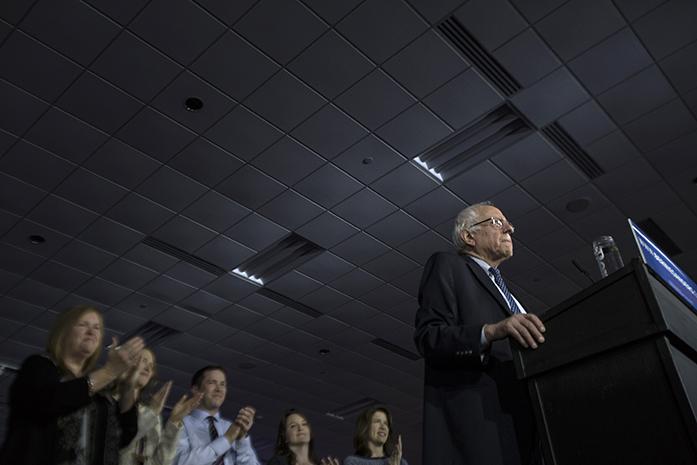On Tuesday, Sen. Bernie Sanders, I-Vt., won the New Hampshire Democratic presidential primary. Sanders’s victory in the Granite State will bring his name to national attention as South Carolina, Nevada, and Super Tuesday approach.
One issue, however, is a point of concern for the democratic-socialist: his foreign policy. While Sanders is known for his liberal viewpoints on domestic policy that have attracted many young voters, his foreign-policy experience is miniscule compared with that of his competitor, former Secretary of State Hillary Clinton.
Despite his comparatively modest foreign-policy background, Sanders has made some statements on the matter that show he has been paying attention. According to The Guardian, when asked about the greatest threat facing the United States among North Korea, Russia, and Iran, Sanders answered ISIS. However, with more prodding, Sanders changed his answer to North Korea, which proved even more appropriate after the country launched a satellite into orbit last weekend.
While The Daily Iowan Editorial Board believes Sanders has a point with the threat of North Korea, he must improve his foreign-policy stances and knowledge if he hopes to win the nomination and the election.
This past weekend, North Korea launched a long-range rocket, putting a satellite in orbit and further proving the country’s ability to launch such rockets. The launch was in defiance of international sanctions. On Sunday, the Security Council claimed that “a clear threat to international peace and security continues to exist, especially in the context of the nuclear test,” CNN reported.
Given the rocket launch and the claim of nuclear weapons, North Korea now poses great threats to the world. A country as politically unstable as North Korea with a nuclear arsenal could certainly prove deadly; more so for Asian countries than for the United States, as doubts remain that North Korea has the technology necessary to reach the U.S. mainland.
So while Sanders was correct that North Korea poses a huge threat, the greatest aspect of the threat is not to the U.S. but to the rest of the world. Meanwhile, on Tuesday night following his New Hampshire victory, Sanders said, “While we must be relentless in combating terrorist[s] who would do us harm, we cannot, and should not be the policeman of the world. Nor should we bear the burden of fighting terrorism alone.”
It is true that Sanders’ claims in this speech largely referred to ISIS, but North Korea poses similar, if not greater, threats to the world than ISIS, and if Sanders is under the impression that North Korea is the greatest threat to the United States, then he is indirectly claiming a position as the policeman for the world. This discrepancy between statements is a minor aspect of Sanders’ concerning foreign-policy background, but the senator’s minimal knowledge on the subject has shown itself before too.
As the New York Times puts it, “The pattern even has some his friends wondering aloud why he has not bothered to prepare stock answers about basic national-security issues.”
The Editorial Board agrees with Sanders that North Korea is a big threat, to the United States and the world. However, acknowledgment of a threat does not qualify a candidate in foreign policy. If Sanders wants the nomination, he’ll have to start better addressing these questions very soon.
RELATED: Bernie Sanders endorsement



